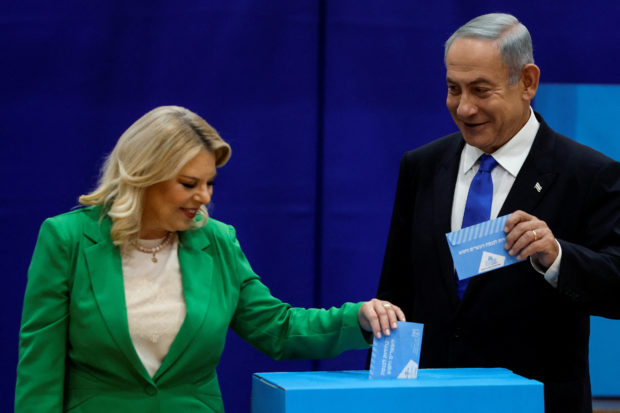Netanyahu poised for comeback in Israeli election, exit polls show

Former Israeli Prime Minister Benjamin Netanyahu stands next to his wife Sara as they cast their ballots on the day of Israel’s general election in a polling station in Jerusalem November 1, 2022. REUTERS/Ammar Awad
JERUSALEM — Former Israeli Prime Minister Benjamin Netanyahu appeared well placed to return to power as exit polls following Tuesday’s election showed his right-wing bloc heading for a narrow majority lifted by a strong showing from his far-right allies.
Israel’s longest-serving premier, on trial over corruption charges which he denies, was poised to take 61 or 62 of the Knesset’s 120 seats, a narrow majority, according to Israeli television exit polls.
“It’s a good start,” Netanyahu, 73, said in a video broadcast by Israel’s public broadcaster Kan 11, but added that exit polls were not the real count.
A final result is not expected until later in the week, and wrangling broke out immediately with Netanyahu’s Likud party warning of possible attempts to falsify the results.
Israel’s fifth election in less than four years exasperated many voters but turnout was nonetheless reported at the highest levels since 1999.
The campaign was shaken up by firebrand West Bank settler Itamar Ben-Gvir and his ultra-nationalist Religious Zionism list, now poised to be the third-largest party in parliament after surging in from the political margins.
Netanyahu’s record 12-year consecutive reign ended in June 2021 when centrist Yair Lapid and his coalition partner Naftali Bennett managed to stitch together an alliance that included an Arab party for the first time.
Security on the streets and soaring prices topped the list of voter concerns in a campaign triggered by defections from Prime Minister Lapid’s unlikely ruling coalition of right-wing, liberal and Arab parties.
Lapid’s camp was poised to take 54-55 seats, making it the second-largest party in parliament, according to the polls.
He campaigned on his stewardship of the economy as well as diplomatic advances with countries including Lebanon and Turkey. But it was not enough to stop the right.
But the campaign was dominated by the outsized personality of Netanyahu, whose legal battles have fed the stalemate blocking Israel’s political system since he was indicted on bribery, fraud and breach of trust charges in 2019.
Netanyahu has been counting on support from Ben-Gvir and fellow far-right leader Bezalel Smotrich, who have moderated some extreme positions but still call for anyone deemed disloyal to Israel to be expelled from the country.
The prospect of a government including Ben-Gvir, a former member of Kach, a group on Israeli and US terrorist watchlists, and who was once convicted for racist incitement, risks alarming allies including Washington.
It also reinforced Palestinian scepticism that a political solution to the conflict was likely after a campaign which unrolled against a backdrop of increasing violence in the occupied West Bank, with near-daily raids and clashes.
“The outcome of this election will be a government that will continue conducting crimes against our people while blocking the horizon for a political solution,” said Wasel Abu Youssef, a senior official of the Palestine Liberation Organization.
The outcome could be affected by whether or not Balad, a small Arab party, gets over the threshold for entry into parliament, which could shake up the distribution of seats and potentially thwart Netanyahu.
The Central Elections Committee said it had found no sign of any manipulation and said there was no basis to rumours of supposed fraud.